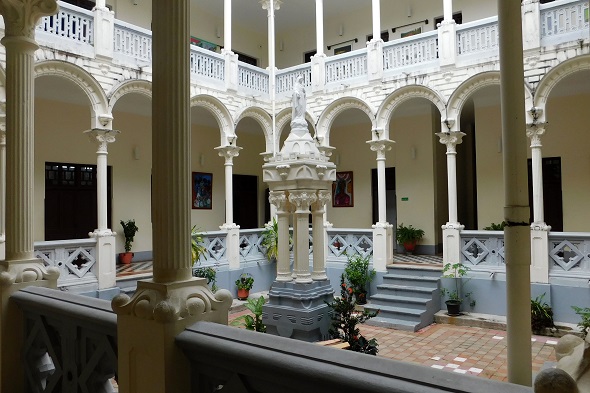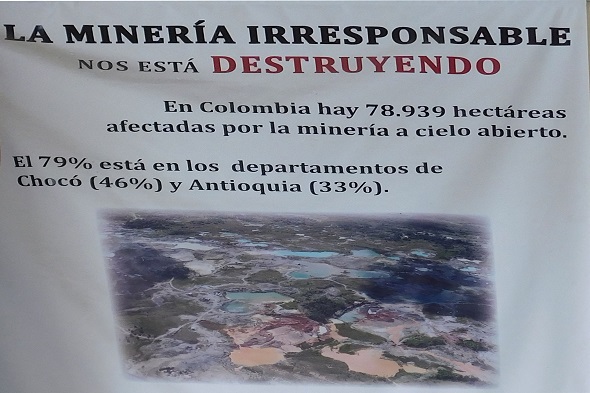And 2018 I visited the department of Collided, In the pacific, one of the regions with the greatest biodiversity and number of indigenous reserves in Colombia. I was invited by Uli and Úrsula, two German friends wearing 40 years working for a Human Rights organization.
The first thing I remember is the lightness of their "reds" —the name of coffee in Colombia— and the first thing that surprised me, the greetings of the people - "at your service", «Your mercy», "Give me change" - and his ceremonious treatment, fruit of Colombian classism and racism.
During my stay I visited with workers from the organization different indigenous and Afro enclaves and I verified the cruel situation in which they live after being expelled from their lands by armed sectors. I left myself for last Quibdo, capital.
As in so many Ibero-American cities, its urban structure is at the service of the private vehicle, since Mr. Ford managed to impose his cars on the continent at the beginning of the 20th century in the face of planning based on European public transport.
A 200 meters a gutter vomited into the open sky and during 24 hours to the Atrato river water and mercury with which the gold is treated
My first visit was to the diocesan see - "the convent" -, elegant and simple neo-gothic modernist building from the years 30 from the last century built by a Catalan architect. From its main balcony I could contemplate a stylized meander of the Atrato, river of "wandering drowsily" due to the slowness with which its waters slide, larger than the Amazon but shorter, that flows into the wide Gulf of Darien. Due to its poisonous color - between chocolate and olive green -, consequence of the high contamination of the discharges—, the boxes abandoned on its banks and the rotten smell that, has lost its original beauty. In fact, a 200 meters from me, a gutter vomited into the open sky and during 24 hours of water and mercury with which the gold is treated.
My second stop was in the Alameda, the only pedestrian street in the city. While its design attracted many protests, today everyone congratulates on their existence, because it is the only enclave where you can walk without fear of being dispatched to the other world by the aggressive vehicles that tyrannize Quibdó.
Due to its poisoned color, consequence of the high contamination of the discharges, the river has lost its original beauty
Until noon, the basky and humid heat prevailed accompanied by an annoying "sirimiri". At twelve, the rain was so bad that we had to take a bus to visit other neighborhoods in the center.
As soon as the downpour stopped, we go to the local market, as full of life as others in Central America. A few years earlier, male-controlled community commerce had been promoted, But since the Community Funds Office did not work, it delegated the treasury and sales networks to women and it did not take long to start.
After eating at the most popular restaurant in Quibdó, we came back home, where I interviewed several members of "Choibá Crafts", association founded by my host -Ursula Crab Apple- to empower women victims of all kinds of violence. It is sustained by the sale of its industrious artisan creations.
My friends prepared for the farewell dinner a mangrove dish - «piangua» - based on local mollusks. Its preparation is meticulous and long: cleaned thoroughly to remove salt and then boiled for four hours due to their hardness. Once ready, served with a local sauce and salad, pasta or rice.
Polygamy is deeply rooted among the lower classes, puzzling fact in a social layer so devoid of earthly goods
Besides my hosts, they dined with us Michaela F. —A German from the organization—, Albeiro M., her husband - an Afro lawyer who accompanies and advises Afro-indigenous ethnic-territorial organizations on matters of defense of the territory, mining, wood, environment and pollution - and your baby, Elina. Both are active and intelligent. According to Uli, it is difficult to find such conscious men, autonomous, brave and honest as Albeiro.
The first topic of conversation alluded to the "sexual culture" of Chocó. Polygamy is deeply rooted among the lower classes, puzzling fact in a social layer so devoid of earthly goods. But, my friends clarified to me that each woman in the "harem" maintains her own house and the proportional share of "husband" that corresponds to her. There are few couples who get married and, when they do, it's in secret, for the "favorite sport" of women is to tempt the male consort. Homosexuality is taboo, as in so many Latin American countries, although the "locos" - as they are called - are allowed to hold their annual parades.
They also spoke of ethnic distribution, which gives a high percentage of Afros, and its religiosity, focused on interesting African rituals, where the role of the priest is that of mere intermediary.
Yet, the issue that most concerned them was drug "micro-trafficking", that had increased rapidly among children because addictive substances were sold along with candy at the doors of schools. The Police is the main supplier of marijuana, they denounce without blinking. However, the most serious problem is the mixture of drugs with "garbage" - crack and other very harmful components., since they enhance addiction.
The farewell was sad and I promised to return one day.
The guerrilla, paramilitaries and armed gangs impose their social control, politician, territorial and economic to indigenous populations
But, your worrisome news about Chocó has come before my return to the region. In a recent letter to the Prime Minister, Ivan Duque, remind you that the ethno-territorial organizations of the department reported in 2004 -Although it was of little use- to the then president Alvaro Uribe of the legitimacy crisis in the Atrato region. They also notify you of the serious humanitarian crisis and the systematic violation of human rights and international humanitarian law against Afro and indigenous communities perpetrated by legal and illegal armed actors.. Other complainants have been the ombudsman, the Office of the United Nations High Commissioner for Human Rights, Afro and indigenous organizations, and the diocese of Quibdó.
After the departure of the FARC-EP of the territory thanks to the Peace Agreement, the THE N has taken over said space, has been strengthened militarily and has increased its attacks on the civilian population. But, the government has neither fought the ELN nor the paramilitaries nor the criminal gangs, that have increased their action in ethnic territories.
Unfortunately, the deep violence prior to the signing of the Peace Accords has returned to the Colombian Pacific coast
The objective of this violation of the rights of the ethnic peoples of the Lower and Middle Atrato is to seize their territories to carry out large economic projects: natural resources exploitation, miners, energy and monocultures in the area. Addition, the illicit cultivation of coca has increased and the community is pressured to grow marijuana, for what they recruit minors; confine and displace ethnic populations; they murder, threaten and target leaders, women leaders and ethnic authorities; and install antipersonnel mines in ethnic territories.
The armed actors - guerrillas, paramilitaries and armed gangs above all - impose their social control, politician, territorial and economic to indigenous populations, annul internal regulations, autonomy and the government systems of these communities and display their power with weapons and hundreds of combatants under the impassive gaze of the Public Force.
Unfortunately, deep violence - mass displacement, confinements, massacres, torture, disappearances, recruitments, violations… - prior to the signing of the Peace Accords, it has returned to the Colombian Pacific coast, one of the most beautiful in Central America.



















